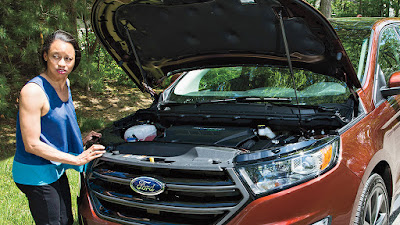Let’s start by getting one thing out of the way: What is an alternator anyway? Your alternator is responsible for preserving your vehicle’s electrical equilibrium; its primary job is to generate an electrical charge that replenishes your battery as you drive. In summertime it’s essential to recognize the warning signs of a faulty alternator—because excessive heat and heavy use of the air conditioning can push your alternator to the brink. Ignore these symptoms, and you could find yourself experiencing the fine summer weather while stranded on the side of the road.
Dashboard Warning
You know that battery warning light that comes on when you turn on the ignition? (Check your owner’s manual for the exact location/appearance of the light in your vehicle.) It should disappear when the engine starts. When this warning light remains on, you have a charging system problem. That could mean you also have an alternator problem.
If this happens to you, head to your Ford Service Center for a battery and charging system test. This test can pinpoint whether the charging system is weak or not working at all—and whether you need a new alternator.
Dim Lights
Sometimes, a weak alternator can affect your car’s lights. If you notice your headlamps or dash lights are dimmer than normal, ask a buddy to help you do a quick test: Start your car, turn on the headlights and press on the accelerator. (Be sure to do this outdoors, not in your garage, to avoid dangerous carbon monoxide fumes.) Have your friend observe. Do the headlamps flicker, dim or get brighter? If the answer is yes, your alternator may be going bad. If the brightness of your lights stays consistent, the problem may lie with the battery, not your alternator.
Dead Battery
Speaking of batteries, it’s important to remember that they aren’t meant to provide long-term power. Instead, car batteries are designed to deliver enough of a jolt to get the car started and then pretty much just sit quietly while the alternator assumes its role as the ongoing power source.
If you turn the key and discover your car won’t start, that dead battery could be a signal that your alternator has flatlined. When the alternator fails, the battery is left to power the vehicle on its own. And eventually, even the most reliable battery will run out of juice.
Luckily, there’s an easy way to find out whether the battery or the alternator is responsible: Jump-start your car and then swiftly remove the cables. Wait a few minutes. If the car dies again, the alternator isn’t properly charging the system and it may need to be replaced. If the car keeps running, then the issue might be your battery. Head to your Ford Service Center, where you can buy a new battery or have a certified technician test your battery’s charge.
Noisy Belts
Do you hear whining even with no toddlers in your vehicle? Chances are, it’s the sound of a misaligned serpentine belt—the long, winding piece of rubber that drives everything from your air conditioning to your steering pump to…your alternator.
The alternator also features a pulley that spins on a shaft, which is supported by either bearings or brushings. An annoying droning sound could mean the pulley and the serpentine belt aren’t in correct alignment, or the bearings and brushings are worn. Consider the noise a wake-up call for an immediate inspection.
Strange Smells
A burning-rubber smell is another sensory cue that your alternator could be in trouble. Once again, the serpentine belt may be the culprit. If it’s not turning freely, it could push additional friction to the belt and generate heat, which, in turn, produces that scent. An overheated alternator can also trigger smells better suited for the racetrack than the interstate. Hold your breath and head over to Hilbish Ford.

No comments:
Post a Comment